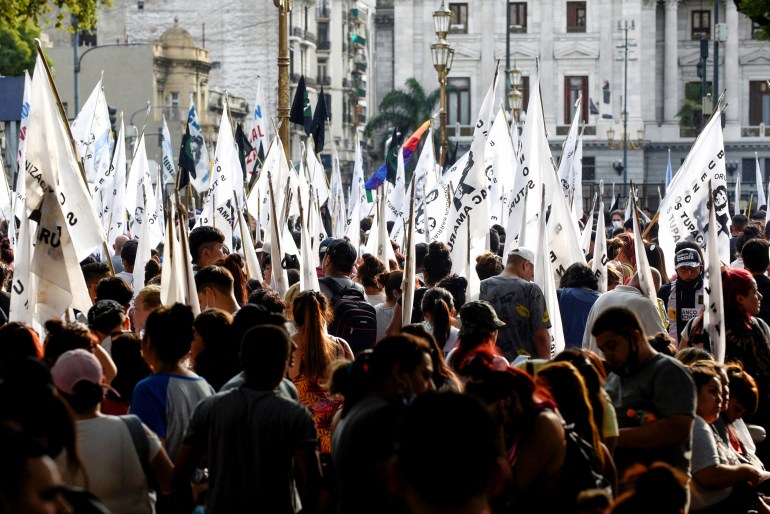Argentina’s Senate approves IMF deal, avoiding default | Business and Economy News
Buenos Aires, Argentina — Behind a wall of steel barricades erected to keep protesters at a distance, the Senate of Argentina approved a deal to refinance the country’s huge loan with the International Monetary Fund and avoid a default.
With a vote of 56 to 13, and three abstentions late on Thursday, the deal has crossed all the legislative hurdles in Argentina, and now moves to the IMF for its sign-off.
Approval was celebrated by the government of Alberto Fernandez, which has assured it will bring “calm” to the country’s volatile economic picture. On the street, in front of the National Congress, crowds of people protested its implementation on the grounds that the cost-cutting terms would be felt the harshest by the poorest in society.
The contentious deal with the IMF is a refinancing of a $45bn loan that had been acquired by the previous administration of Mauricio Macri in 2018. Argentina was due to pay back $19bn in 2022 and $20bn in 2023.
Under the new terms, Argentina has secured a much-needed grace period that postpones repayment of its debt until 2026.
It also calls on the country to gradually reduce its annual primary deficit so that it balances by 2025. Speaking to the Senate this week, economy minister Martin Guzman said the new deal allows the country to avoid “a profound monetary and inflationary stress that would derail Argentina’s economic recovery and have consequences on poverty and the distribution of earnings”.

The deal had driven a wedge in the left-wing political coalition led by President Fernandez. But despite the dissent, Fernandez was able to rely on most of his coalition for support, along with members of the opposition.
Vice-president Cristina Fernandez de Kirchner, who wields enormous power in Argentina, is president of the Senate, but only votes to break ties. Last week, she issued a statement after anti-IMF protesters hurled rocks at the Congress building as the lower house, the Chamber of Deputies voted on the deal. The rocks smashed the windows of Kirchner’s office and damaged it inside.
Her statement recalled the words of Nestor Kirchner, the late president and her husband, with respect to the IMF: “It always acted as a promoter and vehicle of policies that provoked poverty and pain in Argentine society.”
While several senators who voted in favour of the agreement were critical of it and the government, they insisted there was no other choice.
“This deal first of all means that Argentina will not default with the IMF,” Carlos Fara, a Buenos Aires-based political strategist, told Al Jazeera. A default would have drastically limited the government’s access to foreign credit and impeded its ability to govern.
“Even though it doesn’t resolve any particular problems with the economy, it allows Argentina safe passage so that it can organize itself macroeconomically,” he said.
In many senses, the approval on Thursday was “the easy part”, said Fara. Now comes the difficult task of having to comply with the targets set by the IMF, which will monitor progress every three months to ensure the plan is on track.
“Argentina is forced to eliminate subsidies, reduce spending, reduce monetary emission, devalue the peso even more, and increase interest rates, among other things,” said Fara. “If Argentina doesn’t meet its targets, it’s going to find itself in trouble again.”
The country is already in trouble, with more than 40 percent of its citizens living under the poverty line, and inflation continuing to grow at alarming rates. The national institute of statistics, INDEC, recently revealed that inflation had risen 4.7 percent in February alone – 7.5 percent for food. Inflation in the previous 12 months is running at 52.3 percent.
“We’re asking them not to sign this deal because it means more hunger, because they’re going to tighten spending in all directions, and that affects the earnings of workers, who are the ones who always end up losing out,” said Gisella Lazcano, a member of Frente de Organizaciones en Lucha. The organization represents people who cannot find stable employment, have difficulty paying their bills and need help putting food on the table.
“Things have only gotten worse since the pandemic and with this vote, we’re certain that they are never going to stabilize,” she told Al Jazeera, standing outside the National Congress on Thursday. The threat of a default was a moot point for her. “We’re already living in misery.”




